An agreement to stem non-essential travel between Canada and the United States is being interpreted and applied very differently by the two countries, despite the Canadian government’s assurances the restriction would be applied “consistently” on both sides of the border, CBC News has learned.

An agreement to stem non-essential travel between Canada and the United States is being interpreted and applied very differently by the two countries, despite the Canadian government’s assurances that the restrictions would be applied “consistently” on both sides of the border, CBC News has learned.
While Canada has banned all non-essential travel, regardless of the mode of transportation, the United States is only banning non-essential travel across the border at land crossings and by ferry.
“At this time, this Notification does not apply to air, freight rail or sea travel between the United State and Canada but does apply to passenger rail and ferry travel between the United States and Canada,” reads an order published on March 24 in the U.S Federal Register, the U.S. government’s equivalent of the Canada Gazette.
The U.S. Embassy in Canada has echoed that message in its social media posts and in a fact sheet published on its website.
“The United States has reached a mutual agreement with Canada to restrict non-essential travel across our shared land border,” the embassy posted on Facebook over the weekend. “This action does not apply to air, rail or sea travel at this time.”
Officials with the U.S Customs and Border Protection office provided a similar answer — that its land ports of entry would only admit those who provide documentation that they are on essential travel, but the directive doesn’t apply to things like air or sea travel.


